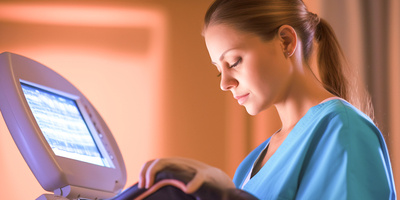
Ultrasounds at Urgent Care: What You Need to Know
Ultrasounds are painless and non-invasive imaging tests that are used to monitor and diagnose many health...
Read moreHelp patients book appointments with you on Solv. It's free!
2 instant-book locations


Help patients book appointments with you on Solv. It's free!
A pulmonary function test is usually performed by a respiratory therapist or another licensed pulmonary expert. In one test, a spirometer with a mouthpiece is utilized, whereas in the other, an air-tight enclosure is used. If your doctor determines that you need a pulmonary function test, you may be sent to a specialist.
A pulmonary function test may be required if you have any of the following symptoms:
Follow these steps to prepare for your pulmonary function test:
Because the test necessitates some rapid and forceful breathing, you may feel dizzy or lightheaded at times. Let your healthcare provider know if you need to take a break. You might be weary after the test and need to rest.
If your results indicate that you have a lung disease, your doctor will talk to you about your treatment choices, which may include pulmonary rehabilitation, medication, or oxygen therapy. Changing your lifestyle can also help you improve your lung health. Quitting smoking, eating a good diet, exercising regularly, and getting enough quality sleep are all important for lung health. Additionally, staying hydrated might help thin mucus in your lungs, making it easier to breathe.
The effectiveness of the lungs is determined by a pulmonary function test. The test evaluates lung volume, capacity, gas exchange, and rate of flow, as well as other lung-related characteristics. Your doctor may be able to identify and treat some lung diseases based on the results.
Pulmonary function tests can be performed in two ways, depending on the information your doctor needs. In some cases, your doctor may request both tests since they measure different things. To evaluate your breathing, your doctor may use a spirometer (a device with a mouthpiece) or have you stand inside an air-tight box that resembles a telephone booth.
The cost of a pulmonary function test is determined by several factors, including the type of test you've had, whether you've had one or both tests, where your test was performed, and if you have health insurance. Without insurance, a pulmonary function test might cost anywhere from $340 to $830.
If you have health insurance, your pulmonary function test may be paid for 80 to 100% of the cost. Your insurance company may want a note from your doctor stating that the test is medically necessary. The amount you pay out of pocket depends on whether you have a copay and whether you have met your deductible. If you have any questions about your personal insurance plan's coverage, contact your insurance carrier.
For a variety of causes, a pulmonary function test may be requested. They're sometimes performed as part of a routine physical exam. They may also be necessary for people who work in hazardous environments, such as coal mines, where the risk of lung illness is greater. Your doctor may conduct a pulmonary function test to help detect allergies or lung problems such asthma, bronchiectasis, emphysema, or chronic bronchitis.
When reading pulmonary function test results, it's important to understand lung function and the typical values for each function examined (total lung capacity, forced vital capacity, residual volume, and functional residual capacity). Your doctor will go through the results of your tests with you and let you know if there are any anomalies to be concerned about.
The test takes 45 minutes to an hour to complete. The results will need to be reviewed by a pulmonologist, a specialist who specializes in lung illnesses. The results will then be forwarded to the doctor who requested the test on your behalf. When your results are ready, schedule a follow-up visit with your doctor to go over them.
It's easy to schedule a pulmonary function test with Solv. In the search bar on our website, type "pulmonary." You'll notice a pulmonary function test choice emerges. After entering your address or selecting the option to use your current location, click the search icon. You'll find a list of providers in your area as well as available appointment times. Fill out the form to schedule an appointment at the best location and time for you.
Some lung function tests can be performed in the comfort of your own home. These use a peak flow meter, which you blow into, to measure airflow. These tests are typically given to those who have been diagnosed with a lung condition and need to monitor their airflow on a regular basis. Contact a doctor if you're having problems breathing or have other symptoms of a possible lung ailment, such as pain when breathing, shortness of breath, or chronic coughing.

Updated on Dec 25, 2024
Solv has strict sourcing guidelines and relies on peer-reviewed studies, academic research institutions, and medical associations. We avoid using tertiary references.
A1C Test in Waltonville
Allergy Testing in Waltonville
Basic Metabolic Panel in Waltonville
CMP Test in Waltonville
COVID-19 Antibody Test in Waltonville
Diabetes Test in Waltonville
Diagnostic Test in Waltonville
H Pylori Test in Waltonville
Hepatitis test in Waltonville
Lab Tests in Waltonville
Mono Test in Waltonville
Pregnancy Test in Waltonville
RSV Test in Waltonville
STD Testing in Waltonville
Strep Test in Waltonville
TB Test in Waltonville
Thyroid Test in Waltonville
Vitamin D Test in Waltonville
Tips, advice, news—your resource to stay healthy and safe while improving your experience with healthcare providers when you need them.